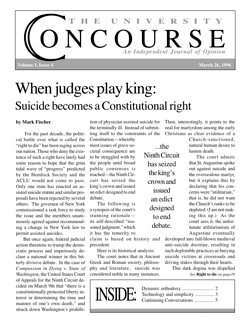Core curriculum and anti-intellectualism
by Adam Tate
As a recent graduate, I want to affirm Dr. Crosby’s efforts toward establishing a real core curriculum at Franciscan University.
The need for a core was not really apparent to me until my final semester. I was in the Honors program, had traveled to Gaming for a semester, and was involved in student life on campus. In addition to my double major in history and theology I took 12 hours of philosophy, a few excellent English courses from Dr. Alexander and Mr. Gaston’s superb “Religion and Culture” course. When I left the University I thought I had a wonderful background in liberal arts and in Western culture. I was correct. As I prepare to receive my Master’s degree in American History from the University of Alabama this May, I am extremely appreciative of my undergraduate education. But I also realize that I am somewhat of an exception. Most friends from school and classmates of mine have a very poor understanding of Catholic history, tradition and culture—despite having attended the premier orthodox Catholic university in the country. Why? Mostly because they were never pressed to take the more difficult liberal arts classes, and thus lost the opportunity to learn about their Catholic heritage.
I argue two things: that a core curriculum of 60 hours in the liberal arts would enhance the mission of the University, and that the anti-intellectualism present on the campus must be eradicated.
Why does our University exist? Undoubtedly, to transmit the beautiful heritage of Western civilization and Catholic culture to those caught in the current culture war against Catholic truth. In order to do this, some basic knowledge of Western civilization and Catholicism must be transmitted to the students. Although some might take issue with me for treating the liberal arts in such a pragmatic fashion, I hold fast to my belief that a good liberal arts education has practical effects on our culture. I agree with Kathleen van Schaijik’s February 27 editorial, in which she criticized “the idea that education consists primarily in the transmission of a given body of knowledge.” I concede her point that the goal of education is to train people to think in reference to the truth. But if we are to restore Catholic culture to a world that hates it, we will need some familiarity with its specific contents. For instance, how could a person begin to understand Catholic culture in the West without first understanding in some degree the history of the West? It is in this learning, in this enculturation—to use Christopher Dawson’s term—that vital information is given to students. Without this information the task of the educated Catholic is greatly hampered.
The second issue I want to raise concerns the atmosphere of anti-intellectualism at FUS. There is an attitude among students that prayer and learning somehow conflict. Many students I knew were at the University for a four year retreat paid for by Dad. Some told me that their primary purpose in being there was to perfect their Christian living, even at the “expense” of their studies.
To illustrate further, allow me to relate an experience I had in the Spring of 1993—one of the most intellectually stimulating semesters I spent at FUS. During that semester a conference on Christian Humanism was held—a wonderful event. It was poorly attended by the student body, despite the presence of renowned scholars and intellects. When I asked someone why he did not attend, he answered with a diatribe against learning, saying that the University was going down the tubes because people were studying more, instead of increasing their prayer lives. At the time, I did not have the heart to quote Aquinas, who said, “In knowing and loving man reaches God Himself.”
After that semester the intellectual level of the campus seemed to drop significantly. I wondered why. The anti-intellectualism, spawned perhaps by a faulty (dare I say Protestant?) idea of faith, is a danger which students must fight if the University is to be at the cutting edge of informed Catholic orthodoxy and culture in America.
Some fear that if the core curriculum is passed the University will become “elitist” and will no longer a home for students with lesser intellects. But why is this a problem? Isn’t the whole idea of a university to provide higher (i.e. above the norm) education to students? FUS must fight to be a university in the traditional Western sense of the word. It must fight against both the modern obsession with specialization and the tendency to transform universities into vocational schools. A core curriculum of 60 hours in basic courses in the liberal arts would greatly advance the goal of creating a university more solidly within the Catholic tradition.
Adam L. Tate, Class of ‘94
Adam Tate and Eugenie Lightfoot (‘95) were married on December 30, 1995. They live in Tuscaloosa, Alabama.


